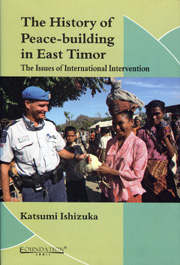Book contents
- Frontmatter
- Contents
- Preface
- Acknowledgements
- Acronyms
- Introduction
- Section 1 Historical Background
- Section 2 Policy Analysis
- Chapter III Review of the United Nations Transitional Administration in East Timor (UNTAET)
- Chapter IV UNMISET and Capacity-building in East Timor
- Chapter V A Judicial Aspect in Peace-building in East Timor: Response to Crimes against Humanity in 1999
- Chapter VI After the 2006 Crisis in East Timor: the Issue of the Exit Strategy and Capacity-building in UN Peace Operations
- Chapter VII Australia's Response to East Timor's Issues
- Section 3 Comparative Analysis
- Conclusion
- Bibliography
- Index
Chapter VII - Australia's Response to East Timor's Issues
from Section 2 - Policy Analysis
Published online by Cambridge University Press: 26 October 2011
- Frontmatter
- Contents
- Preface
- Acknowledgements
- Acronyms
- Introduction
- Section 1 Historical Background
- Section 2 Policy Analysis
- Chapter III Review of the United Nations Transitional Administration in East Timor (UNTAET)
- Chapter IV UNMISET and Capacity-building in East Timor
- Chapter V A Judicial Aspect in Peace-building in East Timor: Response to Crimes against Humanity in 1999
- Chapter VI After the 2006 Crisis in East Timor: the Issue of the Exit Strategy and Capacity-building in UN Peace Operations
- Chapter VII Australia's Response to East Timor's Issues
- Section 3 Comparative Analysis
- Conclusion
- Bibliography
- Index
Summary
Introduction
The pattern of East Timor's process towards independence has been peculiar; it did not follow the decolonisation process of that in many Asian and African states in the 1960s and 1970s, nor the cases of states which became independent shortly after the end of the Cold War. In other words, the independence of East Timor was achieved not as a result of trends in the international political climate but because of ‘some unpredicted events’. Some claimed that such events were the Asian Economic Crisis of 1997 following the fall of the Suharto regime. Another identified the optimistic or brave decision of Suharto's successor Habibie to hold the referendum as the precursor to independence. Or another might give the 1991 Santa Cruise massacre which raised the international awareness of the human rights abuses in East Timor as the reason, as have already been mentioned in this book. However, it is also absolutely true that the history of East Timor and the process to its independence was considerably influenced by the policy of Australia, the important power in the region. Therefore, this chapter focuses on Australia's policy towards East Timor from the political, economic, and security viewpoints.
Australia's strong ties with Indonesia diminished the consistency of its policy in East Timor, which can be recognised by the shift in its vote in the UN General Assembly.
- Type
- Chapter
- Information
- The History of Peace-Building in East TimorThe Issues of International Intervention, pp. 166 - 196Publisher: Foundation BooksPrint publication year: 2010



